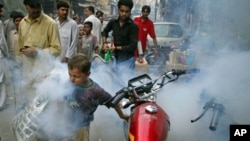The World Health Organization estimates that 2.5 billion people - more two-fifths of the world's population - are at risk of infection with Dengue fever, a mosquito-borne illness that in its worst form can cause death. Until now, efforts to develop a vaccine against the disease have been unsuccessful. Researchers say a couple of experimental vaccines are showing promise.
Since Dengue fever was first identified a half century ago, the incidence of the disease has grown dramatically. The World Health Organization says Dengue fever today is endemic in more than 100 countries, and more than 50 million people are infected every year.
Scott Halstead, senior advisor to the Dengue Vaccine Initiative, an international consortium of medical research groups, said that fluid treatments for the disease have reduced mortality from the most severe form of the illness. But Halstead added that the rainy season in many parts of the tropics and subtropics - when Dengue-carrying mosquitoes are breeding and biting - is still a time of special anxiety because there is no specific medication or cure for Dengue fever:
“While the mortality rate, in reality, is relatively low because of the availability of good hospital treatment, this is almost unlike any other major infectious disease,” said Halstead.
In its worst form, Dengue fever, also known as "breakbone fever," can cause severe internal bleeding, circulatory failure, shock, coma and death.
There are four related, but distinct, types of the Dengue virus that are transmitted by the bite of the Aedes aegypti mosquito. The difficulty in developing a vaccine, according to Halstead, is that a person may develop immune system antibodies against one type of virus, but would have no immunity against the other types.
Halstead said that sets the stage for more serious infection later on.
“The antibodies that are left over from the first infection interact with the second type of the virus, and what we say is it “enhances” the infection; it makes it more severe the next time you’re infected with a different type of virus,” said Halstead.
Experts say it’s usually a second infection with a different Dengue virus that leads to the most severe and sometimes fatal form of the disease - Dengue hemorrhagic fever.
Two promising vaccine candidates now are in the works to protect against all types of Dengue virus. Both vaccines contain the four types of live but weakened viruses, designed to stimulate the body's production of neutralizing antibodies against all Dengue types.
French drug maker Sanofi-Pasteur has reportedly invested nearly $1 billion to develop a vaccine that is proving highly effective in phase-three human clinical trials in Thailand, the last step before regulatory approval. A second vaccine, being developed by U.S. drug maker Inviragen, also has proved to be safe and effective in phase-one human trials.
Dan Stinchcomb, Inviragen’s chief executive officer, said that despite the millions of dollars it has spent so far to develop the Dengue vaccine, the company hopes to keep it affordable.
“Our intention is to try to produce the vaccine at low cost so that we can provide it with help of funding to the poorest in need of the vaccine,” said Stinchcomb.
Progress on both Dengue vaccine candidates was reported at the recent meeting of the American Society for Tropical Medicine and Hygiene in Philadelphia, Pennsylvania.
Vaccines in Development to Protect Against Dengue Fever




